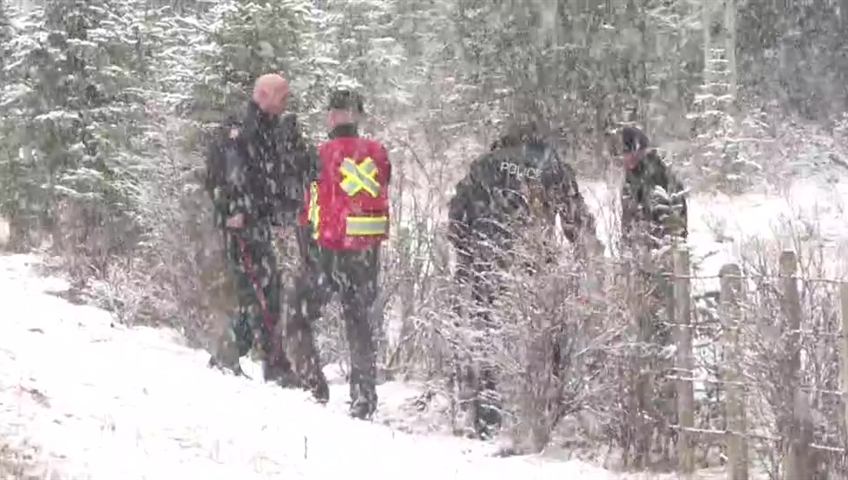It’s been nearly a week since Calgary police investigators, as well as search and rescue officials, RCMP officers and officials from Alberta Fish and Wildlife had to call off a vast search in the Bragg Creek area for the two victims of a suspected homicide.

Jasmine Lovett, 25, and her 22-month-old daughter Aliyah Sanderson were last seen in the community of Cranston on the evening of Tuesday, April 16, according to police. Lovett’s family reported them missing after they didn’t show up to a family dinner on April 23. Police have said there is no evidence to suggest they are alive.
Cellphone pings led police investigators to the Bragg Creek, Elbow Falls, Priddis and East Kananaskis area, and police said Monday it’s believed evidence may have been burned out there.
The search efforts have been hampered by poor weather conditions and snow that’s fallen in the area over the past week, but even in good conditions, the terrain west of the city is challenging for searchers, according to Calgary Search and Rescue manager Bill Hossack.
WATCH: Calgary weather hampers double homicide search efforts. Michael King reports.

Those conditions are challenging both from a safety perspective, and because crews need to be able to actually find what they’re looking for, Hossack said.

Get breaking National news
“If we’re looking for a small object like a glove and there’s three inches of snow that’s fallen since that glove has been dropped, it’s going to be impossible to find that glove until the snow is gone,” he said.
Hossack said that while he couldn’t get into the specifics of how big the search area is, the 23 people that were deployed to the Kananaskis Country area were dealing with varied terrain including acreages, hillsides and wooded areas.
“The difficulty of the search is dependent upon terrain, the condition of the terrain and the weather as well as the size of what we’re looking for,” Hossack said. “You can be an open dry field or a wooded hilly region that’s wet with wet snow and wind, obviously your search efforts are hampered in depending on the terrain, the conditions and the weather.”
Hossack said steeper terrain and less secure footing require more focus and time from the searchers, who are all volunteers, and causes them to fatigue earlier in their search.
“We do hazard assessment prior to every search and ongoing, with each search, all of our members go out on teams and the team leaders are trained to watch the members and… there’s a multitude of factors that can create fatigue and hazardous situations,” Hossack said.
Hossack said there are four types of search techniques personnel will use depending on the size of what they’re looking for and what the coverage area is.
“From hasty searches down trails to a Type 4 evidence search where we’re on hands and knees shoulder-to-shoulder and everything in between,” he said.
WATCH: Calgary police believe evidence burned in suspected double homicide. Jenna Freeman reports.

Hossack said the searchers are sent to specific areas with boundaries so those manning the command post always know where they are. They use radios and cellphones to communicate back and forth, but those methods of communication can also be compromised when they’re out in rugged areas.
Calgary police said Friday it was too soon to say whether the search at Bragg Creek would resume over the weekend. According to Environment Canada, Calgary is due to get more snow on Saturday. The Kananaskis area, observed at Mount Nakiska, forecast rain for the area om Saturday.
Calgary police said investigators have received dozens of tips from the public on Lovett and Sanderson’s disappearance and have more than 50 officers working on the case.



Comments